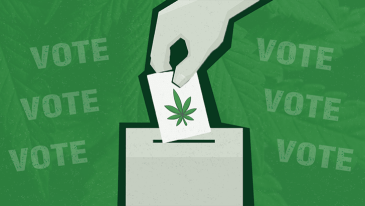Those who wish to perpetuate the failed public policy of cannabis criminalization have lost the hearts and minds of the American public. And they know it.
With public support for marijuana policy reform reaching super-majority status in recent years, prohibitionists and other political opponents have largely abandoned efforts to try and influence public opinion. Rather, they are now relying on gamesmanship to prevent voters from weighing in on the issue. In some cases, they are even willing to overturn the will of the electorate to get their way.
This was the case last election. In Mississippi and South Dakota, reform opponents successfully litigated to nullify election results for a pair of marijuana legalization measures, thereby nullifying the votes cast by 73 percent and 54 percent of voters respectively.
That same year in Nebraska, members of the state Supreme Court struck down a proposed medical cannabis access initiative months after it had been approved by the Secretary of State’s office. Polling in the state showed that 77 percent of Nebraskans backed the initiative, but they never got the chance to show their support at the polls. Months later, Florida’s Republican attorney general successfully brought suit to preemptively deny a proposed 2022 legalization initiative from appearing on the ballot.
Opponents are engaging in similar tactics this election cycle. In Arkansas, they are seeking to invalidate voters’ pending decision on a statewide proposal to legalize marijuana possession and retail sales. Although the measure will appear on the November ballot, it is now up to justices on the state Supreme Court to determine if the votes will ever be counted. In a filing before the court, opponents of the measure have cynically called upon judges to “protect the interests and rights of [the minority of] Arkansans who oppose the legalization of recreational marijuana.” (Statewide polling from earlier this year identified majority support for legalization among voters.)
In Missouri, representatives of a leading prohibitionist organization have joined legal efforts to try and disqualify a citizens’ initiative legalizing marijuana use by adults and providing legal relief for those with prior low-level convictions. Earlier this month, Secretary of State John Ashcroft issued a certificate of sufficiency to the Legal Missouri 2022 campaign, formally placing their initiative on the November ballot. But now opponents contend that election officials erred in doing so, opining that they may have miscounted. (Opponents’ basis for this claim appears to rest solely on initial media reports speculating that advocates risked falling short of signature requirements in one or two districts. Campaign proponents had vociferously denied these reports.) A statewide survey, published earlier this month, finds that 62 percent of registered voters back legalization.
Finally, in Oklahoma, election officials engaged in extensive delays prior to verifying that advocates had gathered the requisite quantity of signatures to qualify an adult-use legalization measure for the November ballot. Now officials are claiming that, because of those delays, there may be insufficient time to formally certify the measure ahead of the coming election. (The issue remains in litigation.)
In a healthy democracy, those with competing visions on public policy vie for voters’ support and abide by their voting decisions. In this case, however, it is becoming clear that those who oppose marijuana policy reform would rather take voters out of the equation altogether. Whether or not one personally supports or opposes cannabis legalization, these cynical and undemocratic tactics ought to be a cause of deep concern.











